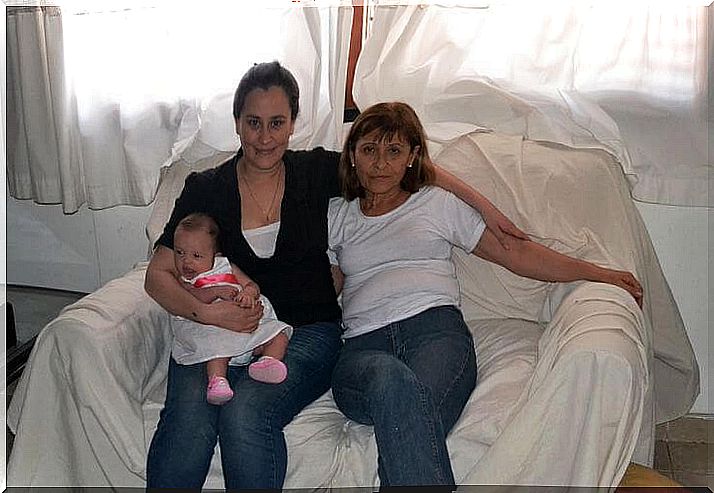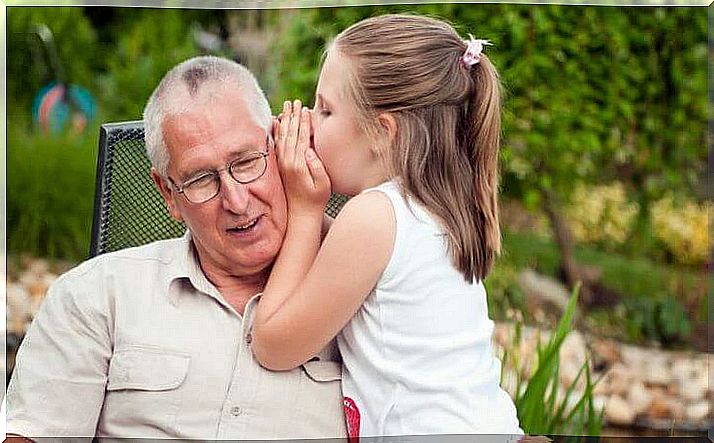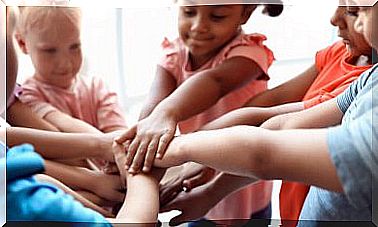Raising Your Child In Your Parents’ House

Surely you imagined leaving the hospital with your baby in your arms and heading to your own home. However, you returned to the home you share with your family to raise your child. Is a peaceful coexistence possible? What are the advantages and challenges of this situation?
It may also be that the amount of time you have to spend outside is the main reason why you have to turn to your family or that of your partner to help you raise your child. So depending on how the grandparents take care of the children, this relationship can be beneficial or harmful.
It is known that having your parents and in-laws on hand to care for your baby is a comfortable, safe and cheap option. In addition, everyone could benefit if they know how to cope with this circumstance, but so that relationships within the home do not wear out, it is necessary for everyone to be careful, understanding and patient.
In this way, in this article we will deal with a topic that possibly requires a good dose of reflection on the part of many women who depend exclusively on the help of grandmothers and grandfathers for the care and education of their children.
Raising your child in your parents’ home, a reflection of a new society
In modern societies, most women are workers or students, so they have the need to turn to their mothers or mothers-in-law for help in taking care of children during their work or academic hours.
However, the fact of leaving your child in the hands of another person, even being highly trusted like any close relative, usually represents a true sacrifice for any mother, although one tries to focus on the fruit of that effort: the future that we can guarantee our little ones.
For that reason, even though you love raising your child, you should religiously leave your baby in the house of those more experienced ladies for a couple of hours. Thus, the child can get used to spending more time with his grandparents than with his own parents, which inevitably influences his education and training.
Consequently, some mothers feel that their children escape their authority in order to morally adopt the grandfather or grandmother as directly responsible for their lives, so they offer their obedience. Thus, the elderly come to feel like the true parents of the grandchildren they care for.
Advantage
- Family ties are strengthened as the child draws closer to his grandparents.
- Through stories and anecdotes, your child will learn family traditions and customs.
- The child may acquire a taste for other hobbies, such as educational games.
- The little one will reinforce the habit of studying and spend more time on homework.
- Children can trust a trusted adult to share concerns, and their grandparents have the experience, wisdom, and patience to listen and advise them.
- Being a baby loved by your grandparents, you will be able to form meaningful, indelible memories with them.
Disadvantages
- Grandparents are consenting and sometimes miss details about education, behavior and limits, as well as healthy habits.
- The child can acquire unwanted habits and customs.
- It may happen that the child begins to feel more comfortable with his grandparents than with his parents, avoiding being with the latter and asking excessively to be with your family.
- Disagreements regarding the upbringing of the child often cause friction, arguments and fights between relatives.
- There is no unification of criteria around what is acceptable and what is inadmissible in the boy’s behavior, as well as no clear limits are established for the boy.
- There is a crisis of parental authority as those who “rule” are the grandparents.

Does the grandmother have decision-making power with her children’s children?
Should we abide by, without the possibility of objecting, the orders of the grandmother when she takes care of our son? Because the child in their care only knows that mom and dad will not be there all day and therefore they must obey their grandparents.
However, the question is: What should mothers do if we appreciate details that we do not like at the level of upbringing and education? Of course, this entails a series of emotional conflicts and family frictions, since grandmothers understand that they have the power to impose their will on children and grandchildren.
With this position, the only thing he does is leave his own children totally unauthorized when it comes to exercising their parental rights and responsibilities, which is sad, unfortunate and painful since sometimes some grandparents turn their children against parental.
Therefore, when choosing the best way to raise your child, ask yourself and analyze beforehand: Is it absolutely necessary and prudent for the child to grow up in your parents’ house? . Will the remedy be worse than the disease, or can you cope with the situation as a whole and positively?
The grandfather who takes authority away from parents
Do you belong to a family in which your mother or mother-in-law considers – wrongly – that she has more rights than you when it comes to raising your child? This is because that grandmother assumes that, due to the bond with her grandson, her orders must be carried out to the letter and strictly respect her advice, which is not always convenient.
Of course, in these circumstances and with this type of family, the considerations and preferences of the parents do not matter, so they are without effect and weight. It is taken for granted that this unfair situation generates family confrontations, as well as moments of anger and anguish.

To agree
After the baby comes home, the family routine changes. The child will cry demanding attention and care, which will affect all members of the family. The uncles will protest because they are not free to bring friends home, the grandfather will complain of crying and the grandmother will want to “adopt” the child as if it were hers.
However, these situations are avoidable as long as everyone is aware in advance of what the birth of the child implies, for which it is necessary to speak beforehand and decide on a reorganization of the house and the roles of your helpers, as well as what they will actually be enabled to do.
The idea is to listen to the opinion of each one, avoiding by all means imposing your needs, since everyone will want to collaborate in some way at this stage of your life. Now, you have to know how to separate the chaff from the wheat: Do you want to help me or get into our life?
The importance of family communication
Remember; Dialogue, communication and respect are ways to explain in time how you want to raise your child and to establish limits for your family so that they do not interfere with what you do not want. But do not forget that grandparents can give advice that you do not want to receive, but they will do it with good intentions.
Clearly, when you share a home, it is not easy to define to what extent you want grandparents to intercede in the upbringing, trying to help you solve difficulties. This is neither good nor bad, but you must be aware that if you allow the grandparents to raise the child, it will be difficult to go back later.
The secret is then to listen patiently to those recommendations and accept what they tell you as a suggestion but never as an order. It is important that you make decisions about your baby, explaining that you prefer to do things differently. After all, you are the child’s mother.









